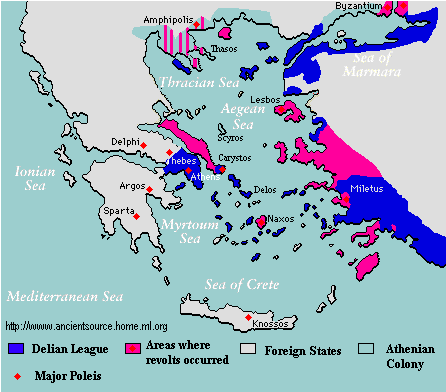I am studying the effects of the Five Laws of Decline throughout history, and I am shocked how predictable this historical and economic method is. Let me share one of the many examples. Perhaps the reader will see a correlation with today’s American Empire. 🙂 Thanks, Orrin Woodward
The Greek City States Alliances
The Greeks were a small band of city-states bound by racial ties, but without a coercive federal union. The Five Laws of Decline (FLD) were held in check by the divided sovereignties of the Greek city-states; however, this changed with the unifying effect of the war against Persia. Initially, Sparta and the Peloponnesian League led the Greek alliance, but after the Persian’s retreat from mainland Greece and the Greek’s counterattack and victory march into the Ionian (Greek) colonies of Asia Minor, the Persian War was effectively over.
The Spartans, to their credit, wanted to terminate the alliance and enjoy some peace and tranquility. Sadly, however, once the Greeks realized the capabilities inherent in united action, the divided sovereignty stage of Greek life ended, and the empire, along with the FLD, began. With the Spartans backing out of leadership, the Athenians, led by their commander Xanthippus, vowed that if no one else would protect the Ionians of Asia Minor, then the Athenians would, especially since Asia Minor, for the most part, originally consisted of colonies from Athens.
The Delian League
 In 477 BC, on the island of Delos, the Athenians led a congress of over 150 states to create a new alliance called the Delian League to fight against the Persians. This league changed the character of the Greeks forever as it launched the ravages of FLD on a scale previously unknown. Without realizing the inherent dangers associated with FLD and empire building, the Greeks formed an offense-minded league to plunder gains from weaker enemies and replace their conventional defense-minded leagues of the past. Despite the noble official aim of the Delian League, “to avenge the wrongs they suffered by ravaging the territory of the king,” in actuality, the league existed to “utilize the burgeoning might of [the] new Athenian Empire to expropriate unjust gains from league members and various victims in surrounding areas.” 🙂
In 477 BC, on the island of Delos, the Athenians led a congress of over 150 states to create a new alliance called the Delian League to fight against the Persians. This league changed the character of the Greeks forever as it launched the ravages of FLD on a scale previously unknown. Without realizing the inherent dangers associated with FLD and empire building, the Greeks formed an offense-minded league to plunder gains from weaker enemies and replace their conventional defense-minded leagues of the past. Despite the noble official aim of the Delian League, “to avenge the wrongs they suffered by ravaging the territory of the king,” in actuality, the league existed to “utilize the burgeoning might of [the] new Athenian Empire to expropriate unjust gains from league members and various victims in surrounding areas.” 🙂
Basically, there were three main objectives of the Delian League: defend against further invasions by Persia, avenge Persia’s invasion, and divide the spoils of war gained by the allies. Each ally was given a choice to either offer armed services or pay a tax into the league treasury. Given the strength of the Athenian forces and the fear of the Persians, most of the states chose to pay the tax in lieu of providing men and ships. The FLD grew rapidly under this fertile field for plunder. As the Athenians realized the ability to reap profit without efforts, the taxes quickly increased, the alliance of friendly states turned into Athenian hegemony over its weaker brethren, and the Athenians ventured out with a funded, aggressive, and victorious military seeking further plunder.
Thucydides commented on the transformation of Athens from ally to empire builder:
Of all the causes of defection, that connected with arrears of tribute and vessels, and with failure of service, was the chief; for the Athenians were very severe and exacting, and made themselves offensive by applying the screw of necessity to men who were not used to and in fact not disposed for any continuous labor. In some other respects the Athenians were not the old popular rulers they had been at first; and if they had more than their fair share of service, it was correspondingly easy for them to reduce any that tried to leave the confederacy. The Athenians also arranged for the other members of the league to pay its share of the expense in money instead of in ships and men, and for this the subject city-states had themselves to blame, their wish to get out of giving service making most leave their homes. Thus while Athens was increasing her navy with the funds they contributed, a revolt always found itself without enough resources or experienced leaders for war.
The Five Laws of Decline (FLD)
By analyzing the behavior of Athens, one quickly identifies the FLD (discussed in my book RESOLVED: 13 Resolutions for LIFE in the Legacy chapter) at work helping to destroy Greek liberty.
First, because of Sturgeon’s Law, it was only a matter of time before the absolute power derived from the Athenian’s dictatorial position drew proto-Machiavellian operators into the leadership positions. The Delian League’s political structure would have required angels, not men, in order to limit the possibilities of aggrandizement inherent in the Delian League’s design.
Second, Bastiat’s Law bloomed when the Athenians realized that, since they were receiving the taxes (tributes) and providing the protection, they also could dictate the terms of the “alliance” because he who has the gold makes the rules. Naxos, was the first island to realize its error and challenge the Athenian political control by attempting to withdraw from the league. The Athenians (the former lovers of liberty) viciously attacked and defeated Naxos, forcing the inhabitants to tear down their wall, surrender their fleet, and lose their vote in the Delian League. Naxos, in other words, was no longer an ally in the Delian League, but rather a prisoner of the Athenian Empire. Other states quickly read the tea leaves, and Athens resorted to threats and attacks to subjugate any allies brave enough to question Athenian hegemony.
Third, Gresham’s Law reared its ugly head by driving any noble politicians of liberty underground. Consequently, the only politicians remaining played power politics games to run the coercive league for personal and professional gain. By 461, the conservative Greek Cimon was ostracized, leading to further influence from the democratic elements led by Ephialtes and Pericles. This signaled the end of the official alliance with Sparta and the beginning of preparations for war between the two rival factions of Greeks – Peloponnesian and Athenian. Easy gain and plunder drove out the character-based conservative leaders and replaced them with plunder-hungry Machiavellian war leaders who catered to the democratic masses.
Fourth, as the Delian League digressed from an alliance into an empire, the Athenians invested time into two plunderous activities: further empire building and continued repression of any “allies” who objected to the Athenian dictates. The Athenian League grew in size and repression. Therefore, the Law of Diminishing Returns (LDR) hindered its effectiveness. In addition, the fear of the Athenian League drew a multitude of rivals to unite under the equally strong Peloponnesian League. Guess what happens when the unstoppable force meets the immovable object? LDR drained the resources of the Athenian and Peloponnesian Leagues while they fought one another for decades in a dispute over greed, plunder, and power – all initiated thanks to the corrosive effects of FLD.
Fifth, the Law of Inertia ensured that the liberties enjoyed by the former independent Greek city states would be difficult, if not impossible, to revive. Each city was forced to choose between one league or the other, as the risk of facing either empire was too great on any one state’s meager resources in comparison with those of the empire. The era of independent city states was finished, and the inertia slammed the door on the previous liberties as powerful alliances were the only way to ensure protection against subjugation. Ironically, the independent city states, in other words, surrendered their independence for fear of losing their independence. 🙂
The subsequent Peloponnesian war weakened both leagues, leaving all of the Greeks prostrate before Macedonia and Alexander the Great. Liberty was snuffed out by innate desire for plunder caused by allowing the FLD to work unchecked. The Greek people would remain subjugated to the Greek, Roman, and eventually the Turkish Empire – their ignoble reward for ignoring the Five Laws of Decline.
Sincerely,









